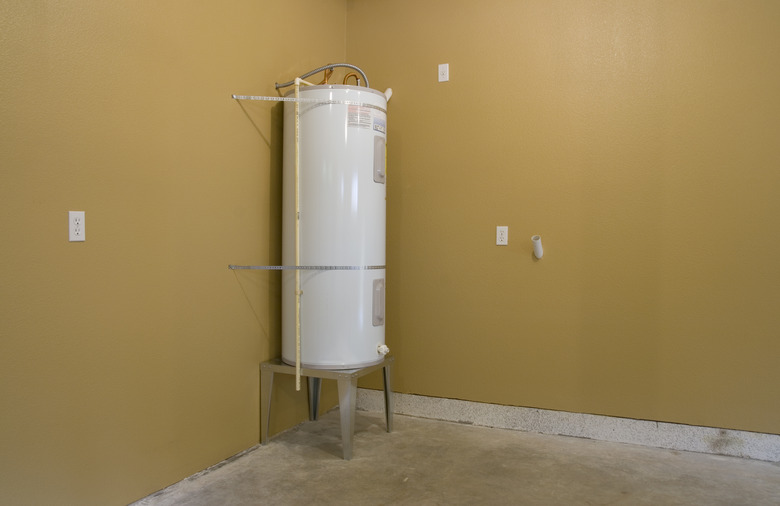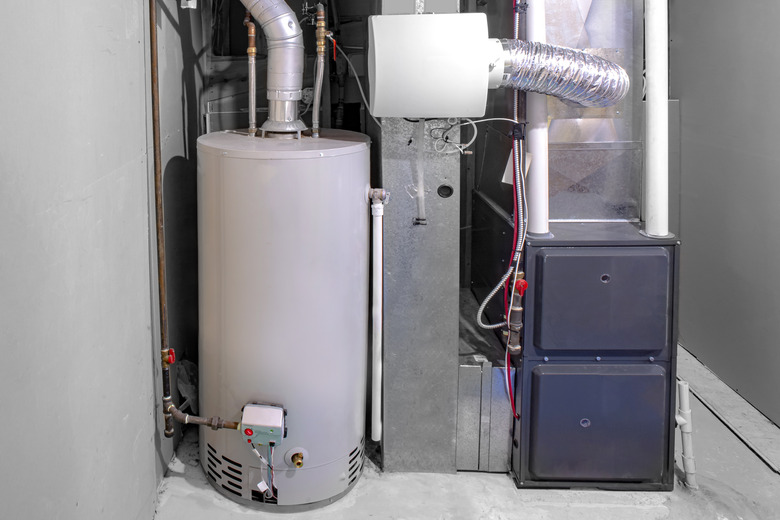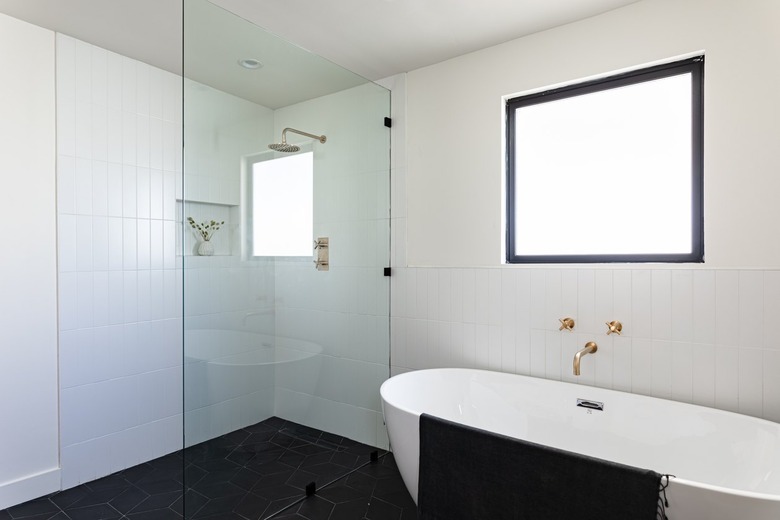How To Choose A Tank-Style Hot Water Heater
We may receive a commission on purchases made from links.
Up to 20 percent of a home's energy use comes from heating hot water (which costs an average family around $500 per year), which is why a high-quality, energy-efficient water heater is such a good investment. While tankless water heaters may be the most eco-friendly option, switching to tankless is pricey, particularly since you might need to replace a gas line to go tankless. That's why many people choose to simply replace their storage tank water heater with a modern model that also uses a tank. If you're ready to upgrade to a new water heater, you should choose the right one for your home based on the fuel type, size, operating costs, and features.
Tank-Style Water Heater Basics
Tank-Style Water Heater Basics
A conventional water heater heats with natural gas, oil, propane, or electricity and keeps it stored in an insulated water tank until it is needed. When someone turns on the hot water tap, hot water flows from the top of the tank, and cold water enters the bottom, where it is heated. While the tank always remains full this way, this also means the tank can run out of hot water if the unit is unable to heat the newly added water before it is pulled from the tank.
Because the water must be kept warm until it is used, these tank water heaters use a lot of energy, even when no hot water is being used. A well-insulated tank lowers energy costs by keeping the water in the tank as warm as possible, reducing standby heating losses. An added insulation blanket is not enough to make up for a lack of insulation built into the tank, however. Gas, propane, and oil tanks do not need as much insulation but should have a thermal resistance of at least R-16. An electric tank should have a rating of at least R-24.
Types of Tank Water Heaters
Types of Tank Water Heaters
When a water heater uses a combustible fuel, such as natural gas, oil, or propane, it emits hot exhaust fumes. Standard water heaters, also called noncondensing water heaters, vent this steam outside the home.
For homes that use a lot of hot water, a condensing water heater may be a good solution. These are tank water heaters heated by combustible fuel that capture hot exhaust gases and then redirect them through a coil at the base of the unit to help heat the water rather than letting all of the exhaust heat go up the chimney (as conventional units do). This increases the unit's energy efficiency and reduces standby heat loss. While condensing units may cost more than conventional water heaters, the increased efficiency means they are likely to save you money if you have a storage tank that holds over 55 gallons.
Electric heat pump hot water heaters, also called hybrid water heaters, are great for any home, but they can be particularly beneficial for homes without gas service. Like heat pump home heating systems, these water heaters extract heat from the surrounding air, sort of like a refrigerator running in reverse. Heat pump water heaters use around 60 percent less energy than standard water heaters. The installation of a heat pump system is similar to standard water heaters, so it is easy to transition from one to the other. While heat pump models cost more than standard tank water heaters, the reduced energy cost means homeowners can recoup their investment in a short period of time.
On the downside, heat pumps aren't as efficient in the cold and should be kept in an area with temperatures consistently between 40 and 90 degrees Fahrenheit. In cooler temperatures or during peak use times, a standard electric heating element kicks on, though this is less efficient than the heat pump. It's also important to note that heat pump units require 1,000 cubic feet of air space to capture heat from the air, so they are often installed in a garage or basement, but they can be installed in rooms or closets with properly ventilated doors.
Water Heater Fuel Options
Water Heater Fuel Options
Most people choose to replace their old water heater with a new unit that uses the same fuel type as their previous model. While this saves money on installation costs, it isn't always the most cost-efficient option in the long run. If you are building a new home, it is particularly beneficial to consider the different fuel types available before deciding on the right power source for your new hot water heater. The most common energy sources for hot water heaters are natural gas and electricity.
Electricity
Electrical units are hardwired into the home and do not require venting like a model using combustible fuel would require. While they are the most efficient models available in terms of energy usage, electricity is more expensive than natural gas. That being said, it's important to keep in mind that different types of water heaters use energy differently, so electric water heaters do not always have higher operating costs. For example, a heat pump water heater is so efficient that it will not only save you money over standard electric water heaters but even over conventional gas water heaters.
Fuel Power
Natural gas water heaters, liquid propane water heaters, and oil water heaters all heat water the same way by using a fuel-powered burner at the bottom of the tank that shuts off when the water reaches the desired temperature. Combustible fuels are typically cheaper than electricity to the point where these units often cost half as much to run as electric hot water heaters, but they come with some additional safety considerations, they cost more to purchase, and they require venting, so the installation can be more complicated. The ventilation system can also result in heat loss.
Choosing the Right Tank Size
Choosing the Right Tank Size
A water heater that is too large will waste energy unnecessarily, while one that is too small will leave you running out of hot water. This is why you must determine how much water your house uses during the peak hour of your hot water usage on an average day in order to find the right-size storage tank.
To estimate your usage during your peak use time, figure out what time of day your household uses the most hot water and then consider all the places you use it during that time period. Typically, people use 10 gallons of hot water per shower, 2 gallons for shaving their face, 7 gallons for a laundry load, 4 gallons for hand-washing dishes, and 6 gallons for a dishwasher cycle. So, if your family takes two showers, does one shave, and washes the dishes in a dishwasher in the morning, your peak use would be 28 gallons of hot water (10 + 10 + 2 + 6). If you aren't sure how much an appliance or activity uses, a simple web search can help you.
You'll want to find a water heater with a first-hour rating that is higher than (but as close as possible) to your home's peak usage. The first-hour rating is listed on the yellow Energy Guide label found on water heaters in the store. It is not the total number of gallons a tank can hold but how many gallons of hot water the unit can supply in an hour of constant use. This number is based on the overall tank capacity, the type of fuel, and the size of the burner or heating elements.
When it comes to tank capacity, families may vary dramatically in how much hot water they use, but there are general sizing guidelines:
- 1 or 2 people need a 30-gallon tank.
- 3 people need a 40-gallon tank.
- 4 people need a 50-gallon tank if using an
electric water heater or a 40-gallon tank if using a combustible fuel source. - 5 or more people need an 80-gallon tank if using an
electric model or a 50-gallon tank if using a combustible fuel source.
Hot Water Heater Operating Costs
Hot Water Heater Operating Costs
The yellow Energy Guide label that tells you the first-hour rating of a water heater will also tell you an estimated yearly cost for a given water heater. This allows you to compare the price of different models and determine which will cost the least (or most) over time, even if a more energy-efficient model costs more to begin with. The yearly cost is based on both the cost of a given type of fuel and the Uniform Energy Factor (UEF) of a specific water heater. UEF is based on how effectively a unit heats water and how much heat is lost in the storage and transmission of the water. The closer a UEF is to 1, the more efficient it is.
To figure out how long it will take for a more efficient but more expensive model to make up for the price difference, find the difference between the cost of the two models and the difference between the annual operating costs. Then, divide the price difference by the difference in yearly costs.
As an example, if a gas model that costs $669 has an estimated yearly operating cost of $288 and a similarly sized electric model costs $509 and has an estimated yearly operating cost of $419, you would first calculate how much more the more expensive model would be to purchase ($160) and then determine the difference in annual operating costs ($131). You would then find that it would take you less than one year and three months to make up the difference in cost variations by dividing the price variation by the difference in operating costs (160/131= 1.22).
Remember that your numbers may be higher or lower depending on your hot water usage and that the numbers will vary as energy costs change.
Things to Look For
Things to Look For
These features can ensure you get a quality water heater that will hold up for years to come:
- A good warranty: Energy
savings and product costs are relatively meaningless if you need to replace
your water heater in only a few years. Always check the product's warranty since
it could range anywhere from three to 12 years. Models with a long warranty are
typically higher in quality, though they usually cost a little more. - Self-cleaning units:
Mineral buildup can make your water heater work harder and become less
efficient. A self-cleaning model can reduce buildup by swirling the water at the
bottom of the tank. While these are nice, a lengthy warranty is more important
to the longevity of your water heater. - Glass-lined or stainless steel tanks: These materials are designed to reduce corrosion in the tank,
which can destroy a water heater. "Glass" tanks are technically porcelain
enamel, which works well but not as well as stainless steel, which is more
expensive. If you live in an area where the water is very acidic or contains a lot
of minerals, a stainless steel tank may be worth the increased price.
References
- Water Heater Medic: What are Some Pros and Cons of an Oil Fired Water Heater?
- Lowe's: Water Heater Buying Guide
- Water Heater Hub: Water Heater Buying Guide – Tank Type
- Energy.gov: Heat Pump Water Heaters
- Energy.gov: Estimating Costs and Efficiency of Storage, Demand, and Heat Pump Water Heaters
- Energy.gov: Sizing a New Water Heater
- Energy.gov: Selecting a New Water Heater
- Energy.gov: Storage Water Heaters
- Consumer Reports: Water Heater Buying Guide


